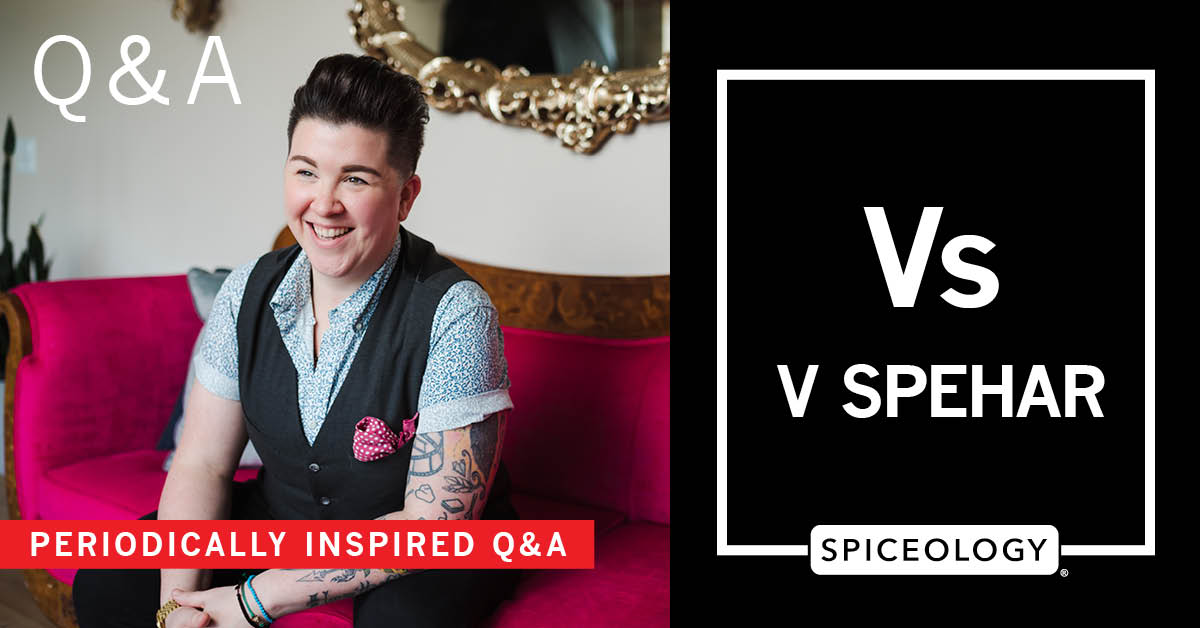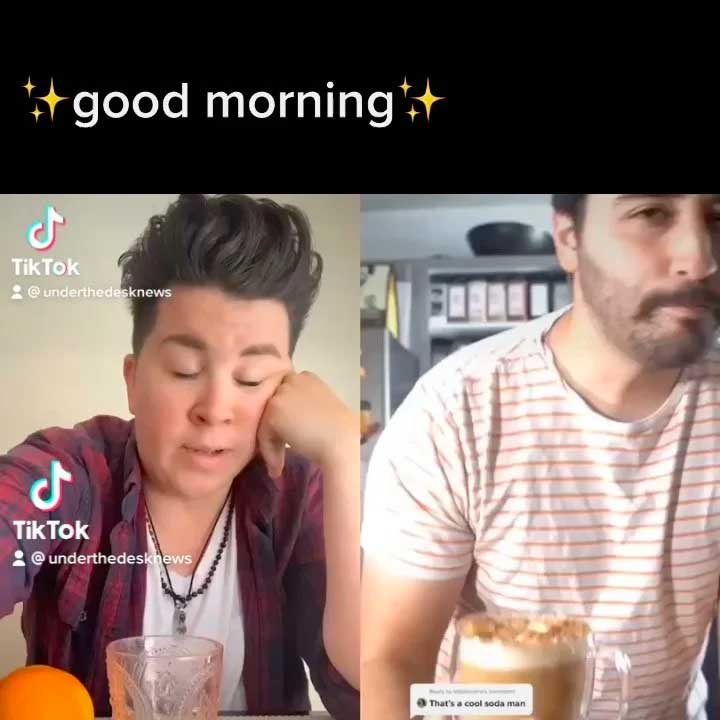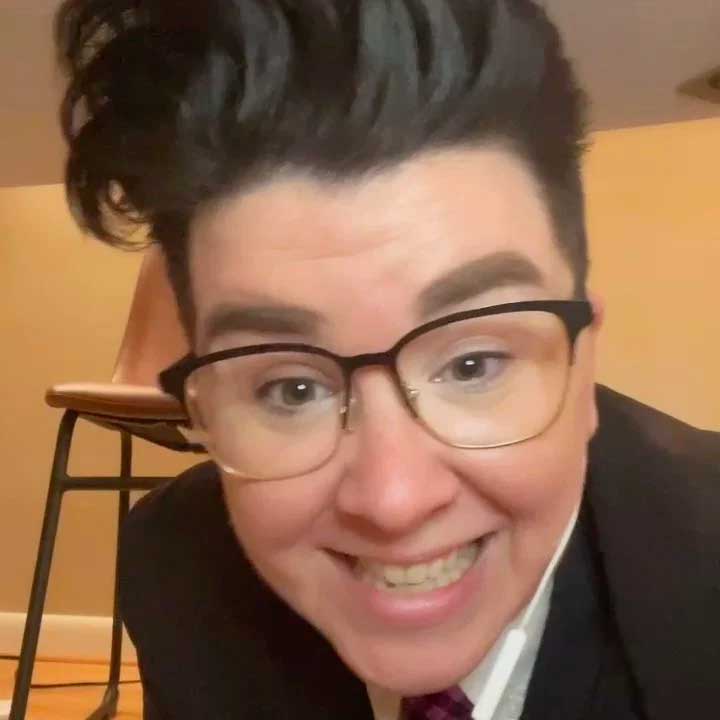
V Spehar is exactly the kind of person the culinarian world needs right now. They’re funny, experienced, respected, considerate, intelligent, and perhaps most importantly not afraid of change. In fact, they’re demanding change, food justice and education, and a new set of rules for the restaurant industry – and they’re putting in the work to make real change happen.
V is the current Executive Director of EverythingFood, and former Director of Impact for the James Beard Foundation. They have been a decades-long champion for LGBTQ+ leadership in the policy and food space and are a founding board member of Queer Food Foundation and the Host/Creator of @underthedesknews on TikTok, offering 60-second daily wrap-ups of current events, political analysis, and special interest stories “explained”.
With a deep passion for the democratization of food, V also co-created FoodFarmacy, a HIPAA-compliant software platform that matches chronically ill patients with farm-fresh produce boxes and medically tailored meals delivered straight to their home at no fee to the patient. We recently sat down with V for our Periodically Inspired interview series that takes a deep dive into the worlds and lives of culinarians and F&B pros – read the full interview below:
When did you first develop a love of food?
“I have a very clear moment of consciousness when my grandma used to make potato salad. Everyone would always ask, ‘Betty – how do you make it?’ Her potato salad is the first time I remember loving food. I can remember her doing all the steps, and then finally when I was around 5 years old she let me help and showed me how to mash the potatoes and mix everything with my hands. I remember the feeling of mashing everything together – it was a moment of awakening and consciousness. I remember my grandmother standing by me and the smell of perfume.To this day I still make it with my hands – it might be a simple dish but it makes a difference when you’re making something with love.”
How did your path lead to food justice? Why is that a passion?
“First I got fancy – working at some of the most idolized restaurants in New York, but I didn’t feel any better as a person. I grew up middle class with a normal childhood. I wanted to be more connected to like-minded people, which led me to food justice and equity. Just because you know french terms and your restaurant wins awards, it’s not everything; it’s what you can do and how you can serve when you don’t have any of those things that matters. I love the physical act of giving people food. I ended up at Hungry Harvest in Baltimore, a produce delivery company that is democratizing the food system. At the time I had no business applying for a job there since I had no policy knowledge – but it was a calling and I knew I’d be good at it.”

What are significant areas the F&B world can help with sustainability?
“Ethics and accessibility and the why behind who gets to eat – what it means to serve someone paying $200 a plate versus serving food in a volunteer capacity. Most of all – taking back control of the LUXURY of dining, whether that’s white table cloth or picking up drive-through; having someone serve you, craft a menu, guide you through an experience, people need to know how to appreciate the experience. The customer is not always right, people have not been trained to experience social dining or service – we have a collective responsibility to re-balancing that power dynamic.”
What would you say are the biggest challenges to accessing healthy eating?
“Interest. We have this idea of ‘treats’ and brand name loyalty built through decades of persistent marketing. Produce is kinda nameless… and ‘diets’ like paleo/keto can come off as polarizing communities that a person seeking healthy eating doesn’t understand or identify with. Food literacy, how to prepare whole foods, how to build a balanced meal… We lost these skills to the rise of fast food, TV dinners, and cuts to public education. Home Economics and High School culinary classes were valuable life skills classes that were cut alongside art, music, and other creative electives.”
People around you, music, books, travel – where do you find inspiration?
“My wife is a cellist and incredibly curious person – be it finding natural experiences for us to explore, or signing us up as members of the local historic reenactment village, creating her own music, collabs with her friends. She reads a lot and we spend a good amount of time just wondering about the world and people and talking.”
How do you approach changing the rules of the restaurant industry?
“You have to change the leadership. Changing the leader – you truly can not be the creator of the culture and the state of the industry AND the one to “fix it.” For example, all due respect to Danny Meyer who built an empire in this industry, but he won’t also be the one to fix the inequity. Someone else will have to create and apply the solution, to take control of the experience and train the guest.
Over the summer, everyone was quick to promise they’d improve equity in their restaurant. The same folks complain that minorities won’t apply for jobs even though they say in the for-hire It’s just as detrimental to pretend that you’re inclusive as being a known toxic space. maybe you can’t be inclusive right now. Chefs and restaurant owners need to look at your history – you might have a bigger mountain to climb when it comes to addressing the systemic issues of inequity in your business. If you make surface-level changes – people see right through it.”
As restaurants begin to reopen fully and hire new staff – how can owners and chefs create an inclusive environment?
“If you believe you want to be inclusive – let’s say in this case to the LGBTQ+ community, you need to imagine what the day in the life of queer staff member would be like. Think, ‘If I were a queer person – what is the person training me like?’ How are your customers and staff treating queer people – what are your policies on leave? Queer individuals can live more complicated lives, and it’s a social dynamic you might not understand if you’re not a member of the queer community. Ask yourself – would you want to work here as a queer person? Inclusivity is not just having equitable policies on the inside, but setting standards for how your staff is treated by the guest.. Don’t recruit if you’re not ready – put in the work. The work toward inclusivity might be uncomfortable and hard, but it does pay off.”

What were some of the biggest lessons learned during your role at the James Beard Foundation?
“I was shocked how people don’t care about awards as much as you’d expect. Awards are designed for a small specific number of people, and the rest of the industry doesn’t even qualify or have the resources to navigate the advocacy and public relations campaigning it takes to be noticed and subsequently juried and nominated. My work was outside the awards entirely and I’m very grateful for that. The impact work I did in the year I was head of Women’s Leadership and LGBTQ inclusion was important and I met some incredible folks who Beard Foundation may not have otherwise been engaged with. In that year we were able to spotlight truth and struggle of being woman or queer-owned, and personally I had an opportunity to do a lot of quality listening on a national scale. However, right as we were beginning to hit a stride the pandemic hit – and the impact programs were the first departments to be cut.
The idea of having ‘arbiters of success’ – Beard, Michelin, Worlds Best – is a difficult place to be in, what do you do when you built the empire and the empire is problematic. Do we need ‘King Makers’? I think that’s what this year and the rebuilding of the industry will decide. Who and what is ‘the best’ and who gets to decide?
Where are places you visit or what are things you do if you’re ever in a motivation block?
“When I’m truly overwhelmed I cook like I’m catering a wedding. (laughs) Cooking copious amounts of food, all the tools and appliances going – it’s absolute chaos, but it allows my brain to work out everything else. Prep is a very underrated time for deep reflection, when you’re chopping carrots or breaking down a cow and just working out all the trauma, fears, and visioning for the future you wouldn’t otherwise have time for. Cooking like that allows your brain to work in the subconscious.”
What advice would you give a student looking to make a difference in the food or hospitality non-profit world?
“Don’t assume all non-profits are good or all LLCs are bad. At a not-for-profit you’ll spend a lot of time fundraising, At an LLC you’ll spend a lot of time selling your mission and proving you’re one of the good guys in the capitalism game – I’d advise looking for published outcomes and understanding what “a day in the life” is like before judging if the company you’re joining is right for you and how you do your best work. Also, when you’re new in your career, your chance will come – but won’t come any faster if you’re stepping on other people’s backs to get there. Know what your goals are and plan for periods of rest. You don’t have to win every award, or be the biggest to have a sizable impact.”
Are there any trends from the pandemic shut down that created change for good in the restaurant industry?
“Chefs and owners gained the ability to control the guest and menu more than control of their space during the pandemic. There was a great restart on that. There are a lot of people and guests who have a renewed value for restaurants and staff.
During the pandemic you saw the breaking down of empires. If you had 40 restaurants it was harder to pivot than if you could transition to take out. People are looking to meet their neighbors more, they missed their local places. Also, since people were stuck at home and found themselves cooking more, they have a better understanding of the cost of food and again have a greater respect and value for the role restaurants play in a community.”
Where did the concept of @underthedesknews come from?
“Genuine fear. In the first episode I found myself explaining the 25th amendment to Mike Pence during the riots. I have a limited government background, but I thought about what I would be doing if I was in DC. I’m good at taking the scary out of something and a good explainer – people liked it so I started there, and the plan is to keep it going.
And exciting – I’ll be guest hosting Radio Cherry Bomb – a blessing from Kerry Diamond. I’m a little nervous but it’s important to authentically building representation of Queer folks outside of Pride month or diversity boards. We are here doing quality work all year round, What’s the saying? It’s hard to hate someone up close.”

How can culinarians embrace self care?
“I’m so glad to see how the industry has changed in the last 10 years. Your labor is extremely valuable – the work you do matters. Embrace the self-care – if you helped one person in your day, great, if you didn’t help or serve a single person, you’re still doing a good job. Many of us came to the industry because we were misfits, but now there’s more respect for restaurant workers and within the industry. Many restaurants have taken shift drinks away, since it can cause problems for a lot of people. Back then that Bud Light was therapy, but now we have learned there is importance in showing our staff they are valuable and important with words, compassion, fair wages, cross-training opportunities and creating a safe working environment. Restaurant work is not just something you do in between your next career. Continue to fight unhealthy behaviors in the kitchen because what you do is important work.”
What do you consider a chef’s role to be in a community?
“Whatever the chef wants it to be. There’s so much pressure to be this omnipotent creature – be whatever you want. Is it to provide a space of gathering and collaboration? You run a restaurant – you’re the kitchen table of humanity. Or let’s say you don’t want any of that, you’re shy – just make a great breakfast sandwich, that is also enough. Anything you feel comfortable with. Chefs might often feel obligated to be this strong hand – you don’t have to be.”
What are ways “regular” citizens can help fight food insecurity and bolster food access?
“Start small. In what ways can you show up? If you have lots of income – donate. Are you well connected? Use your influence to change minds and build networks. Start locally – your school, mayor, city council. Know who you are in the chain because it needs all different people: listeners, collaborators, etc. On the flip side, if you have power, success and influence – make sure you are listening to the people you’re trying to serve; if you’re not, it’s a waste of resources, you’re just creating a solution AT someone, and it may be a huge waste of time and money if it’s not what folks actually need.”
Favorite dish to cook for yourself?
“I love using up everything in my fridge, I get huge satisfaction out of making these kinda ‘monster meals’ the odds and ends of this or that all put together. If I was planning to make something I really enjoy cooking big breakfasts, I’m crazy about eggs, scratch-made sausage gravy and biscuits, fruit, maybe beans or grits.”
Favorite movie and book?
“I love musicals, so my favorite movie would be 42nd Street. For books, I love The Lorax. When I was a kid I was sent home with a Lorax badge for talking out of turn. I was the anti-bully bully, so I won the Lorax award. More recently, I really liked Conversations with God – it got me thinking about how I’m approaching the use of religion and speaking directly to God.”
V is often found serving as a culinary personality, podcaster and host you can see more of V in action at vspehar.com. Follow them on Instagram and TikTok over at @underthedesknews.


